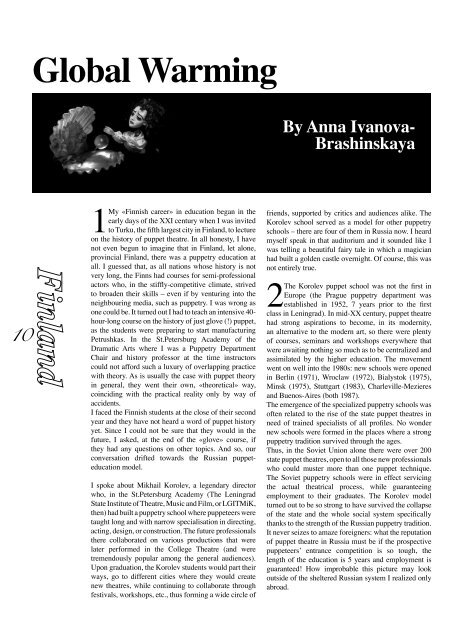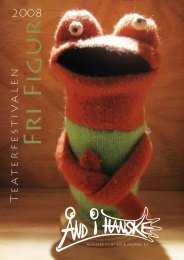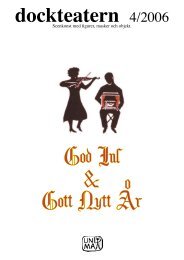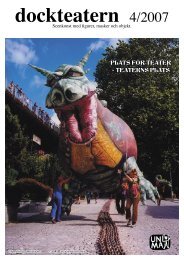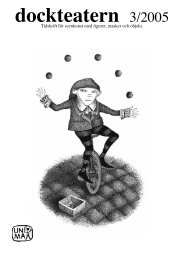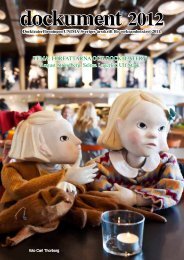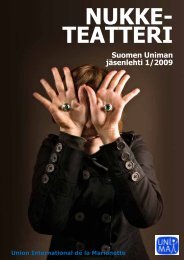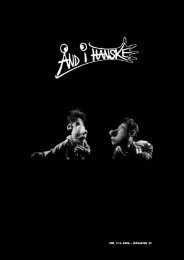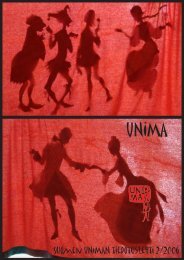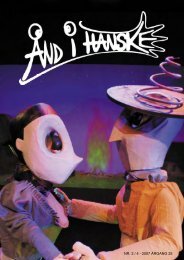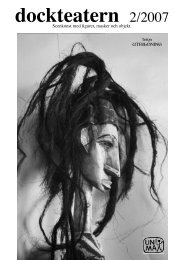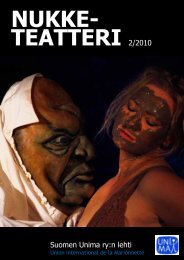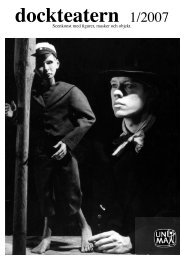:by Anna Ivanova-BrashinskayaGlobal WarmingBy Anna Ivanova-Brashinskaya101My «Finnish career» in education began in theearly days of the XXI century when I was invitedto Turku, the fifth largest city in Finland, to lectureon the history of puppet theatre. In all honesty, I havenot even begun to imagine that in Finland, let alone,provincial Finland, there was a puppetry education atall. I guessed that, as all nations whose history is notvery long, the Finns had courses for semi-professionalactors who, in the stiffly-competitive climate, strivedto broaden their skills – even if by venturing into theneighbouring media, such as puppetry. I was wrong asone could be. It turned out I had to teach an intensive 40-hour-long course on the history of just glove (!) puppet,as the students were preparing to start manufacturingPetrushkas. In the St.Petersburg Academy of theDramatic Arts where I was a Puppetry DepartmentChair and history professor at the time instructorscould not afford such a luxury of overlapping practicewith theory. As is usually the case with puppet theoryin general, they went their own, «theoretical» way,coinciding with the practical reality only by way ofaccidents.I faced the Finnish students at the close of their secondyear and they have not heard a word of puppet historyyet. Since I could not be sure that they would in thefuture, I asked, at the end of the «glove» course, ifthey had any questions on other topics. And so, ourconversation drifted towards the Russian puppeteducationmodel.I spoke about Mikhail Korolev, a legendary directorwho, in the St.Petersburg Academy (The LeningradState Institute of Theatre, Music and Film, or LGITMiK,then) had built a puppetry school where puppeteers weretaught long and with narrow specialisation in directing,acting, design, or construction. The future professionalsthere collaborated on various productions that werelater performed in the College Theatre (and weretremendously popular among the general audiences).Upon graduation, the Korolev students would part theirways, go to different cities where they would createnew theatres, while continuing to collaborate throughfestivals, workshops, etc., thus forming a wide circle offriends, supported by critics and audiences alike. TheKorolev school served as a model for other puppetryschools – there are four of them in Russia now. I heardmyself speak in that auditorium and it sounded like Iwas telling a beautiful fairy tale in which a magicianhad built a golden castle overnight. Of course, this wasnot entirely true.2The Korolev puppet school was not the first inEurope (the Prague puppetry department wasestablished in 1952, 7 years prior to the firstclass in Leningrad). In mid-XX century, puppet theatrehad strong aspirations to become, in its modernity,an alternative to the modern art, so there were plentyof courses, seminars and workshops everywhere thatwere awaiting nothing so much as to be centralized andassimilated by the higher education. The movementwent on well into the 1980s: new schools were openedin Berlin (1971), Wroclaw (1972), Bialystok (1975),Minsk (1975), Stuttgart (1983), Charleville-Mezieresand Buenos-Aires (both 1987).The emergence of the specialized puppetry schools wasoften related to the rise of the state puppet theatres inneed of trained specialists of all profiles. No wondernew schools were formed in the places where a strongpuppetry tradition survived through the ages.Thus, in the Soviet Union alone there were over 200state puppet theatres, open to all those new professionalswho could muster more than one puppet technique.The Soviet puppetry schools were in effect servicingthe actual theatrical process, while guaranteeingemployment to their graduates. The Korolev modelturned out to be so strong to have survived the collapseof the state and the whole social system specificallythanks to the strength of the Russian puppetry tradition.It never seizes to amaze foreigners: what the reputationof puppet theatre in Russia must be if the prospectivepuppeteers’ entrance competition is so tough, thelength of the education is 5 years and employment isguaranteed! How improbable this picture may lookoutside of the sheltered Russian system I realized onlyabroad.
3The population of Finland is a just over 5 mln.– nearly as big as that of St.Petersburg. Untilrecently, there were 4 puppet theatres under thebill for theatres and orchestras enjoying on the top oftheir self-generated income permanent governmentand local council subsidies. Since the oldest of them,Vihreä Omena (The Green Apple), closed in Helsinkiin 2004, there are three: Mukamas in Tampere, Sampoin Helsinki and Hevosenkenkä in Espoo, the fastgrowing city in the capital region. Each employs fiveto ten people. Aside from the state theatres, a numberof small independent companies of various degreesof quality and professionalism are striving to survive,depending mostly on small grants from public funds(both government and local) and private foundations.Finland in this regard does not stand alone: puppeteersthroughout the European North share the same livingconditions. Almost untouched by the volcanic changesof the mid-past-century, the professional puppettheatres in all these countries (Sweden, Norway,Denmark, and Iceland) put together can still be countedalmost on the fingers of two hands. Not to mention thespecialized education: it ended never really havingbegun. In the Norway Drama Academy (Fredrikstad), abrief tryst with the puppetry was soon replaced by themore fashionable “physical theatre”; in the StockholmDramatiska Institut irregular puppetry courses stoppedin the early years of this century; Iceland and Denmarkhave never known a regular puppetry education at all.In the Baltic states (Estonia, Latvia, and Lithuania) thesituation is similar. So the Puppet Theatre Departmentestablished in the Turku Arts Academy in 1999 turnedout to be the only one in the huge North-Europeanregion, which is so greatly developed in many othercultural ways.4Does all this mean that the North of Europe is thepuppetry’s «tabula rasa», the snowy blank spoton the map of puppet theatre? Yes, but only ifby «tabula rasa» one means not the emptiness, but thepromise of future filling. And the quality of this fillingdepends almost entirely on what the puppet educationis prepared to offer to the theatre world.Indeed, the problem of students’ future employmentmust concern a school and influence its educationalconcept. A student must graduate prepared to competenot only in the world of contemporary theatre, alreadysetand not always friendly to newcomers, but also withhis/her classmates who are gearing for the same. At thesame time, a potential to create a new theatrical structurefor the region which is quite open to that is no lessimportant for today’s graduates than competitiveness.In effect, it means that a student must be educated mostbroadly and fully in all the aspects of the craft, and atthe same time present a highly defined individuality.The first thing most of the prospective students arewilling to admit at the entrance exams is that they havenever been to a puppet theatre. The teacher’s task, while,perhaps, smiling inwardly, is to realize this innocencenot as a shortcoming, but as a virtue of a future student.He/she does not know yet what puppet theatre is andmust be, how it «may», or «may not» be done. Thisstudent is also a «tabula rasa» offered to the teacher tobe filled out with a maximum spectrum of possibilities.The student’s task, then, is, having orientated him/herself in the diversity of the types and techniques, findhis/her own private personal puppet theatre.What this really means is a reformulation of theprofession of the educator (or, Master, as they arecommonly called in Russian schools). The Master asa keeper of a certain tradition, of a specific aestheticsthat he is called upon to transfer onto his students,becomes unnecessary, even harmful under the «tabularasa» circumstances. Today, instead of teaching thestudent a certain specific system of theatre, the teachermust program the process so that in the group aspectit would develop «horizontally», wide, and in theindividual aspect, «vertically», deep into the craft. Thiscalls for a replacement of a «teacher» with a kind of a«programmer», who is fluent in all the languages thatthe medium can speak in and strives to program thestudents so that they are broadly informed and narrowlyspecialized at the same time.Considering how to meet such demands, we at the PuppetTheatre Department in Turku came to the conclusionthat a thought-through system of master classes andworkshops with the lead practitioners of the craft fromall over the world would work best. The invited foreign«guest-stars» would conduct an intense introductioninto a narrow specialization (marionettes, glove, paper,or shadow theatre, object and texture theatre, masks,etc.), while the staff teachers would adopt the role oftutors, developing the condensed knowledge of themaster class into a broader picture and fitting it to eachstudent’s individual needs and abilities.The key to this «tutoring» job would be to protect astudent from any kind of «final knowledge», any kindof assumption or preconception of what the puppetand puppet theatre actually are. Each project requiresan invention of a new language, a new puppet theatredetermined by the material. A rejection of teaching acertain method becomes a method in itself, a method inwhich a shift is taken from technology to the substanceof the art form as it exists today.5All the changes that have been happening inEurope in the recent past seem to be pointing in thesame direction. Thus, the formation of EU causeda unified system of curricula and credit certification(ECTS - European Credit Transfer System). Specialfunds were created specifically to support the studentand teacher exchange programs (the most popular ofwhich is Socrates-Erasmus). The system of studentfestivals has developed greatly. Regular puppet schoolfestivals, such as those in Bialystok, Wroclaw, andCharleville-Mezieres, partly financed by the sameEuropean educational programs, have become arguablymore popular among producers and professionals thanthose of professional theatres. Student productions thatby definition must possess pedagogical rather thanartistic merit have often turned out to be more modernand inventive than the «well-made» professional11


